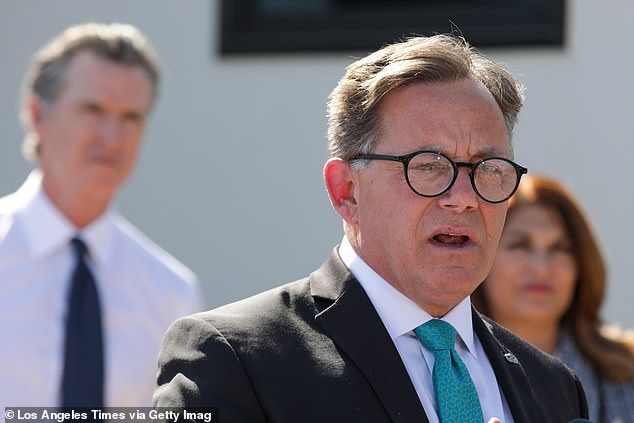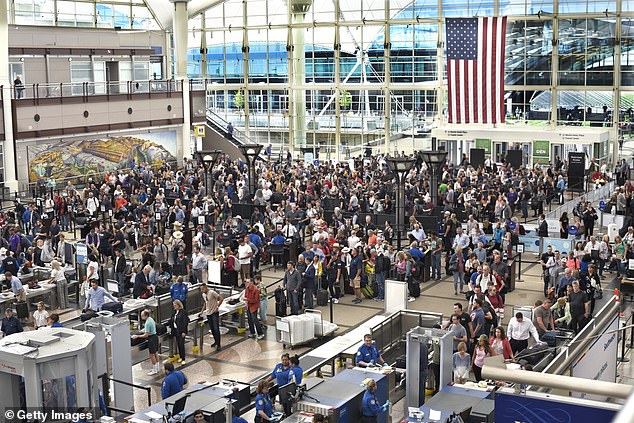California launches a bid to ban the line-skipping program at airports used by thousands of American travelers… because of ‘equity’
- A new bill would ban the line-skipping company Clear from California airports
- California State Senator Says Clear Program Isn’t ‘Equitable’
- Dave Cortese, chairman of the Senate Aviation and Transportation Committee, wrote a letter opposing the bill in California
A California Democrat introduced a bill, the first of its kind, that would ban Clear from airports in the Golden State.
California Senator Josh Newman claims the private security company is not providing an “equitable” service.
“It’s a fundamental equity problem when you see people who subscribe to a concierge service being escorted by people who have waited a long time to get to the front of the TSA line,” Newman told CBS MoneyWatch.
He added, “Everyone is disappointed with the travel experience, and when Clear is escorting a customer for you and tells TSA, ‘Sorry, I have someone better,’ it’s really frustrating.”
A California lawmaker is proposing a bill that would ban the company Clear from airports in the state

California State Senator John Newsman said: “It’s a fundamental equity issue when you see people who subscribe to a concierge service being escorted in front of people who have waited a long time to get to the front of the TSA line.”
Unlike the government-contracted TSA PreCheck, Clear is a private company that offers subscribers the ability to skip the airport security line entirely. Most people who have Clear also purchase TSA PreCheck to skip the line and receive the abbreviated version of TSA security checks at the airport.
The standard price for an annual Clear membership is $189 and is used to verify passengers’ identities and an employee will escort them to the front of the security line.
TSA PreCheck costs $78 for five years and $70 for renewals and prevents subscribers from having to remove items of clothing such as shoes, jackets and belts while going through security. It also allows passengers to keep electronics in their bags instead of removing them for screening.
If someone has Clear but doesn’t have TSA PreCheck, they only skip the first part of the TSA security screening process, i.e. the line, and boarding passes and IDs are checked.
Skipping the line at Clear usually puts someone ahead of the TSA PreCheck line, where others also pay – a much lower amount – for an abbreviated airport security check.
If Newman’s SB-1372 bill passes, Clear would no longer be allowed to operate at California airports.
Delta, United, Southwest, Alaska, JetBlue and Hawaiian, all major U.S. airlines, oppose the bill.
They wrote a joint letter this month to Senate Transportation Committee Chairman Dave Cortese, arguing that its passage would lead to revenue losses and noting that the services were used more than 5 million times in California in 2023.
Airlines argue in the letter that the bill “not only threatens to increase airline fees, but also severely limits airports’ ability to effectively manage security checkpoint lines, resulting in a negative travel experience for our California customers.”
“We are proud to partner with nine California airports, creating hundreds of jobs, sharing more than $13 million in annual revenue with our California airport partners and serving nearly 1 million Californians,” a Clear spokesperson said in a statement to MoneyWatch.
“We always work with our airline and airport partners and with local, state and federal governments to ensure all travelers have a safer and more convenient checkpoint experience.”
In addition to Clear being used at approximately 50 airports in the US, dozens of sports stadiums and other venues also use the identification verification service.

TSA security lines are notoriously slow and cumbersome when flying in the US and several programs are trying to speed up this process – including Global Entry, TSA PreCheck and now Clear
Newman said his bill would still allow Clear to operate its own dedicated security line, separate from other passengers, but prevent them from jumping ahead of others who have already waited.
“The bill is not intended to punish Clear or put Clear out of business,” he said. “It wants to create better traffic flow so that customers don’t come into contact with the general public and create a moment of friction that is so frustrating for the average traveler.”
“All it does is increase the tension in the line.”
There is bipartisan support for the legislation from Republican Senator Janet Nguyen of California.
The Association of Flight Attendants-CWA (AFA-CWA) also supports the bill, along with the union representing Transportation Security Officers in the California cities of Oakland, Sacramento and San Jose.
